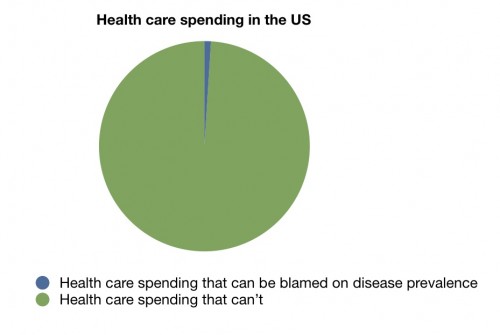Aaron Carol, at The Incidental Economist, has a post showing that disease prevalence (including obesity) in the United States is a very, very small portion of what is driving health care costs:
Before you start in on me about how obesity is linked to other things and such, you should know that the overall McKinsey & Company analysis showed that the prevalences of disease in the US could account for perhaps an extra $25 billion in health care spending. Let me make a new chart for you:
Yes, obesity is more prevalent in the US, and yes, caring for it costs real money. But even if we get obesity down to the levels in other countries, it’s not going to magically erase the problem. We are spending two to three times per person what they are. There is no simple fix here. There is no one, and no thing, we can easily blame.
Everyone, always will look for a scapegoat. It is in our genes. The good vs. evil story is the oldest trope in existence. Look at the current outcry against “evil speculators” in oil markets (I wonder why Krugman doesn’t make a post about that?). Humans live through stories, humans respond strongly to in-group loyalty, humans have value preferences that lead them to view the world radically differently. I’ve often stated in debate that those who think that a single-payer health care system would somehow reduce our expenditures to a level consistent with other OECD countries are dreaming, at best, or delusional, at worst. And every single data point that passes by in the health care debate does nothing but strengthen the position that Robin Hanson articulated: health care altruism is a permutation of our evolutionary drive to “show we care”; or rather, make infrequent, and very large expenditures to show our loyalty to an alliance. The frequency has gotten greater as our society has gotten richer, but the underlying motive is still linked to our evolutionary roots.
Against this strain of thinking is the hypothesis that Matthew Yglesias articulated in his Bloggingheads diavlog with Karl, that people are stingy in the voting booth, but acquiescent in the doctor’s office. So separating payment and service would act as a brake on health care expenditure. I’m very skeptical of this argument. After all, health care expenditures have risen at a higher rate than GDP/per capita in many countries around the world.
A more interesting question, though, is why is the US different? My crude outline of a hypothesis is that people in the US have only recently come to “share a heritage” that is the United States. It’s only been around 100-ish years that people have really come to view themselves as “Americans”. In the absence of a shared heritage (which provides a built-in in-group), it has been especially important to engage in acts that show inter-tribal loyalty. The US spent a greater amount of money/life/time ending slavery, securing women’s right to vote, and ending segregation than a lot of other countries. We’ve also spent more money/ink/time securing a the minimal welfare state that we have, that is exceedingly expensive (relatively speaking). Not surprisingly, we also spend a ton of money/ink/time on health care that is of extremely dubious effectiveness. A cynic might say that this represents the greater wealth of the United States…but that doesn’t really provide an satisfactory explanation. We have low taxes, so we get away with a lot of inefficiency, but I don’t think that is the underlying driver of our proclivity to expend a lot of resources doing different things.
I think that history will show that Robin Hanson is right, and that whatever health care arrangement we devise, it will continue to be significantly more expensive than the world norm. That it has relatively little to do with the structure of the market (though I stand firmly behind a completely free market in primary care/pharmaceuticals [except antibiotics/microbials]), and a lot to do with our evolutionary drive as a “multi-tribal” society.
Filed under: Health Care, Society

